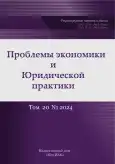Modern Approaches to Forecasting Corporate Income Tax Revenues in the Russian Federation
- Авторлар: Dekanova D.R.1, Khoruzhy V.I.1
-
Мекемелер:
- Financial University under the Government of the Russian Federation
- Шығарылым: Том 20, № 1 (2024)
- Беттер: 225-229
- Бөлім: Finance
- URL: https://journal-vniispk.ru/2541-8025/article/view/284334
- DOI: https://doi.org/10.33693/2541-8025-2024-20-1-225-229
- EDN: https://elibrary.ru/NSPOMW
- ID: 284334
Дәйексөз келтіру
Аннотация
The purpose of the study.The purpose of the study is to determine the optimal model for forecasting corporate income tax revenues. The subject of the study is modern methods of forecasting income tax revenues to the budgets of the subjects of the Russian Federation, based on mathematical and statistical, regression and autoregressive models with a moving average. The article identifies the advantages and disadvantages of existing approaches to forecasting tax revenues, as well as defines the conditions for the applicability of the considered models in conditions of high dynamics of changes in market conditions and macroeconomic uncertainty. The results of the study are presented, which make it possible to establish the optimal methodology for forecasting corporate income tax receipts, taking into account the statistical limitations of the planning horizon, as well as to identify a forecasting mechanism available for use in long-term planning.Conclusions. Based on the results of the study, it was concluded that it is advisable to combine tax forecasting models to achieve optimal predictive and analytical indicators, as well as to apply this approach only within the framework of short-term planning. The final forecast indicator can be identified on the basis of expert assessments, the average value of the indicators obtained, or through a combination of these approaches: an expert assessment of the weighting coefficients to calculate the weighted average value of the forecast indicator.
Толық мәтін
##article.viewOnOriginalSite##Авторлар туралы
Datkaayim Dekanova
Financial University under the Government of the Russian Federation
Хат алмасуға жауапты Автор.
Email: aima.dekanova@mail.ru
ORCID iD: 0009-0004-8690-7398
SPIN-код: 9019-6400
Department of Taxes and Tax Administration, Faculty of Taxes, Audit and Business Analysis
Ресей, MoscowValery Khoruzhy
Financial University under the Government of the Russian Federation
Email: vikhoruzhij@fa.ru
ORCID iD: 0000-0001-6268-6640
SPIN-код: 5497-9908
Dr. Sci. (Econ.), Associate Professor, Professor of the Department of Taxes and Tax Administration, Faculty of Taxes, Audit and Business Analysis
Ресей, MoscowӘдебиет тізімі
- Abdullabekova A.M., Jafarova N.G. The Influence of Tax Revenue Planning on Economic Growth // Economics and Business: Theory and Practice. 2021. No. 9-
- Boboshko N.M. Identification of Trends in the Development of Tax Revenues in the Consolidated Budget of the Constituent Entities of the Russian Federation // Bulletin of Economic Security. 2021. No. 2.
- Egorova A.A. The Use of Economic and Mathematical Methods in Tax Forecasting // Economy and Society. 2018. No. 6 (49).
- Zvereva, T.V. New Philosophy of Tax Administration in Digital Reality / T.V. Zvereva // Innovative Development of the Economy. —2021. —No. 1(61). —pp. 166–175. —doi: 10.51832/2223-7984_2021_1_166.
- Imanshapieva M.M. Tax Planning and Forecasting at the Macro Level for the Main Federal Taxes (Using the Example of the Republic of Dagestan) // Taxes and Taxation. 2020. No. 1.
- Krempovaya N.L. Assessment of the Current Practice of Budget Forecasting of Regional Budget Revenues // Scientific Bulletin: Finance, Banks, Investments. 2022. No. 2 (59).
- Lesunova A.E. Tax Revenues to the Consolidated Budget of the Russian Federation: Assessment, Factor Analysis and Forecasting of Indicators // Skif. 2021. No. 5 (57).
- Leukhin R.S. Short-term Forecasting of Budget Revenues Using a Combination of Forecasts // Financial Journal. 2019. No. 3 (49).
- Tashmatova R.G. The Role of Tax Forecasting in the Formation of Budget Tax Revenues // Economics and Business: Theory and Practice. 2018. No. 1.
- Fedotov D.Y. Analysis of Forecasting Tax Revenues of the Russian Federal Budget // Accounting in Budgetary and Non-profit Organizations. 2018. No. 4 (436).
- Fedotov D.Y. Assessment of the Deviation of Tax Revenues to Regional Budgets from the Forecast Value (Using the Example of the Irkutsk Region) // Vestnik TSEU. 2018. No. 2 (86).
- Khizhak N.P. Predictive Assessment of Tax Revenues of Budgets When Applying Special Tax Regimes // Taxes and Taxation. 2020. No. 1.
- Chimitdorzhieva E.T. Short-term Forecasting of Tax income of the Consolidated Budget of the Republic of Buryatia // Bulletin of the BSU. Economics and Management. 2020. No. 2.
- Chimitdorzhieva E.T. Forecasting Income Tax Revenues to the Consolidated Budget of the Region // International Journal of Humanities and Natural Sciences. 2019. No. 5-4.
Қосымша файлдар








